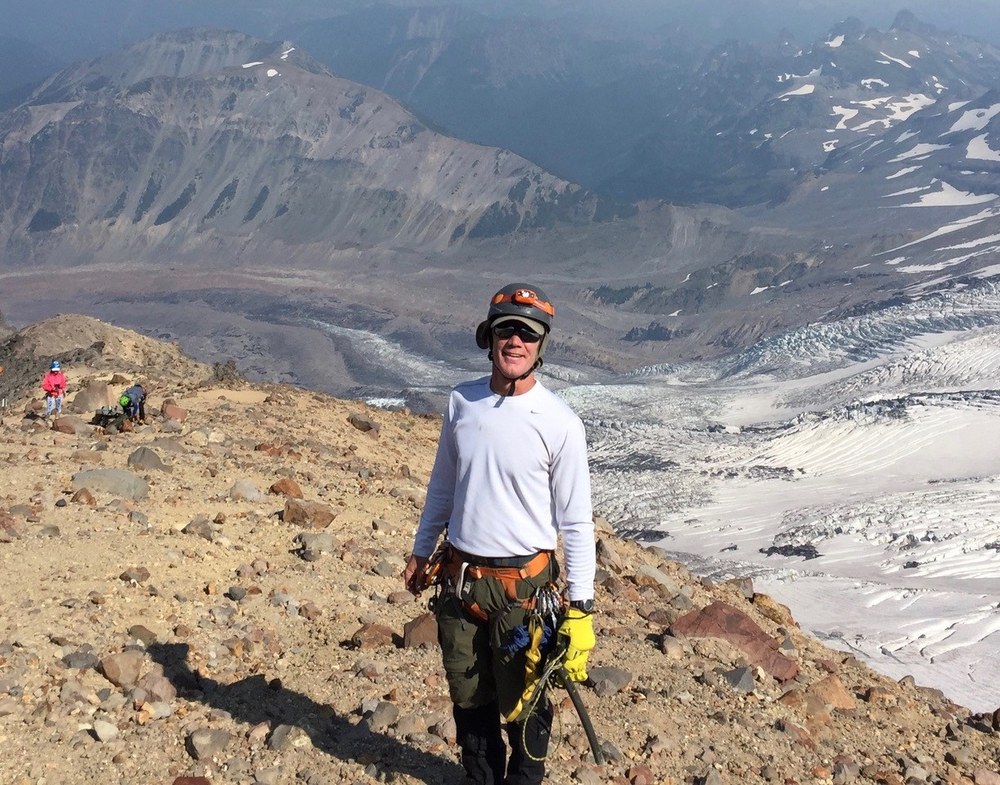
For our Leader Spotlight this month we talked to Jerry Logan, a volunteer with the Kitsap Branch who takes pride and joy in helping new climbers achieve summits they didn't think were possible!
Name: Jerry Logan
Branch: Kitsap
Where do you live? Bremerton, WA
How long have you been a leader? 3 years (member since 2013)
What activities do you lead? I chair the Kitsap Navigation Committee, and I teach navigation in the Basic and Intermediate Climbing Courses. I recently assumed duties as the Kitsap Branch Chair.
Leadership Questions
What inspired you to become a Leader for The Mountaineers?
The most significant factor was the leaders who helped me through the basic climbing course and the climbs I had in my first two years with the club. I truly believe we could not afford this talent if we had to pay for it. Now as a rope leader and fairly new climb leader, getting to participate in successes for newer climbers gives me a great feeling of satisfaction and pride. It is especially great when someone tests their limits to achieve a summit where they did not know if they could do it.
What is the favorite trip that you've led for The Mountaineers?
This has to be the crevasse rescue field trip to Mount Baker we take our basic climbing students on in May each year. It is the first really challenging approach for many, and getting to hang in a crevasse as part of the rescue practice is a unique experience - it is hopefully the only experience we get in a crevasse as Mountaineers!
How has your leadership style evolved as you've gained experience as a Leader?
I think I've learned the most about paying attention to the physical condition of every person on a climb. In every case the issues that have come up have had to do with fitness or health, and not an injury that occurred on the climb. So, I think it is learning to pay attention to the condition of the party in addition to my own, and recognizing that rest or delay may be the best plan sometimes.
Are there any learning experiences you can share with us, such as take-aways from a close call or a near miss?
I can think of two right off hand. The first was while rock climbing near Leavenworth. Conditions were a little damp resulting in more stressful climbing than I had done to date. I found when getting to an established belay station that it took me three tries to tie a clove hitch, which is one of our bread and butter hitches. Talking about it with my partner led us to conclude that maybe we were a little too close to our limits, so we took a break, had some fuel, finished the climb, but called it after that. I think what I took out of that is that even the most basic things have the potential to result in bad consequences if you don't pay attention to them. Maybe especially the basics, since that is what we do the most.
The second case was a vertigo problem one of our party experienced as we approached the summit of Sherman Peak on Mount Baker earlier this year. As we ascended, one of his ears did not equalize, resulting in vertigo and disorientation that did not improve with rest and nourishment. We short roped and used additional climbers to assist him to climb down, and his condition improved fairly quickly as we descended and his ear came back toward equilibrium. Turned out he had been hit by a soccer ball earlier in the week, but did not think too much of that. What I learned there was that really talking in detail about any preexisting conditions at the trailhead or the start of the climb is really important so you have some background on your partners, especially if one becomes disoriented and can't communicate fully.
What advice do you have for aspiring leaders in The Mountaineers community?
I would say first to find a mentor or mentors who you really have confidence in and pay attention to what they do and how they do it, and strive to understand why. Fortunately, we have many of these in the Kitsap Branch and all around The Mountaineers.
Anything else we should know about you?
I got started with serious mountain climbing pretty late in life - early 50s - when I was finishing up a career in the Navy. I thought if I was going to join the climbing community I wanted to be a contributing member and not a load on the system. So, I joined The Mountaineers and when I was qualified I signed on with Olympic Mountain Rescue, as well. I have found both to be very rewarding. My wife, Teresa, does compare it to being on a Navy deployment, but I am working on that!
is there Someone that you'd like to see in the spotlight?
Send an email to Sara Ramsay to make a recommendation for one of our upcoming Leader Spotlights!
Add a comment
Log in to add comments.I didn't know Jerry was career Navy (though that totally makes sense)!
I didn't know Jerry was career Navy (though that totally makes sense)!
 Sara Ramsay
Sara Ramsay